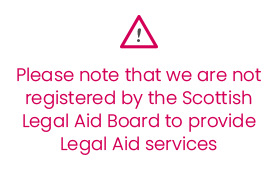Divorce for the Self-Employed in Scotland
Divorce, where one or both partners are self-employed, follows the same process like any other and is no less stressful. A key point of difference, however, is likely to be in the financial settlement of the divorce.
Business interests can be valued as part of the financial disclosure exercise to calculate the “pot” of matrimonial property or assets to be divided on divorce. However, valuing such interests can be problematic. The valuation of an individual’s interest in a business (and any associated pension arrangements) is often a matter of dispute. Additionally, the valuation of a shareholding in a privately-owned company can be particularly contentious when trying to divide matrimonial property “fairly” between the parties and the rest of the family.
Business interests and financial settlements
Self-employment can involve different structures through which the business is carried out:
- For a sole trader, the income and profitability of the business are the most important figures, though there may be business assets such as vehicles or premises to take into account. If employed, a person’s salary is set out clearly in payslips and the annual P60 form. On the other hand, self-employment means that a person’s income recognition can be more complicated and critically more uncertain, causing problems when trying to resolve a financial settlement. Future income, potentially important for any child or spousal maintenance, can be vulnerable to illness, injury or motivation.
- If in partnership with someone else, valuing the business will have added complications depending on the nature of the business and the partnership agreement.
- Alternatively, the business may be incorporated as a limited company. As a shareholder and director, there is an entitlement to a share of the profits, director’s remuneration (which will impact on the declared pre-tax profit) and dividends. If the shares are owned by more than one person, valuing the business will be more complicated.
Scotland is different from other parts of the UK in that business interests, as with other assets, will generally only be taken into account as matrimonial property if they were set up or acquired after marriage. However, if there has been an increase in the value of pre-existing business interests during the marriage, this may count as part of the matrimonial assets. A business will not normally be ordered to be sold, as it would possibly be counter-productive and create tax issues. Continuity of an income is likely to be important and the courts will aim to compensate the other spouse with a larger share of assets, or possibly maintenance. If you find yourself facing such issues, independent and specialist legal advice is essential.
Contact our Divorce Solicitors Glasgow, Scotland
At Miller Samuel Hill Brown, we provide clear expert advice on all aspects of family law including divorce and civil partnership dissolution. Based in Glasgow City Centre, our divorce lawyers also help clients in Glasgow’s West End, South Side, Paisley and across Renfrewshire and Central Scotland. Let us help you. Please contact our divorce and dissolution specialists today via our online contact form.














